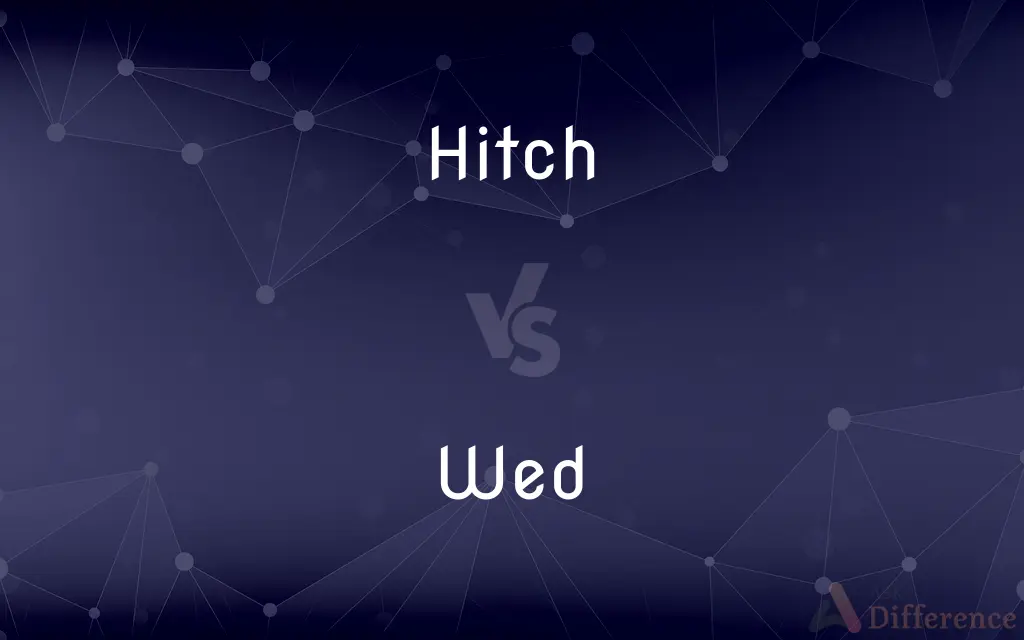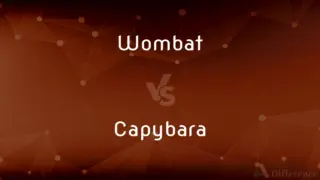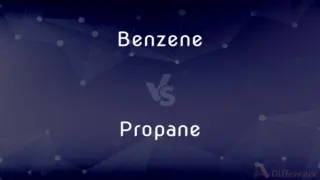Hitch vs. Wed — What's the Difference?
By Fiza Rafique & Urooj Arif — Updated on May 8, 2024
Hitch often implies a temporary or minor problem (e.g., a hitch in plans), while wed refers to getting married or joining together firmly.

Difference Between Hitch and Wed
Table of Contents
ADVERTISEMENT
Key Differences
Hitch is typically used to describe a temporary setback or obstacle in a process, suggesting a minor issue that can often be resolved. On the other hand, wed usually refers to the act of marriage or a long-term union, highlighting a commitment or bond.
When used figuratively, a hitch can mean an unexpected problem that disrupts events or plans, implying the need for adjustments. Whereas wed, in a metaphorical sense, can mean to bind or join ideas, objects, or entities in a close relationship or alliance.
In everyday language, "hitch" might also refer to linking something temporarily, like hitching a trailer to a car. Conversely, to "wed" someone or something typically suggests a permanent or long-lasting connection, often formal or ceremonial.
The colloquial expression "without a hitch" indicates that something has gone smoothly with no problems. On the other hand, expressions involving "wed" often relate to wedding ceremonies or marital status, such as "newly wed."
In terms of usage context, hitch is commonly found in casual and practical scenarios, focusing on the short-term aspect of linking or experiencing obstacles. Wed, however, is predominantly used in contexts involving personal relationships or legal and religious ceremonies, emphasizing permanence and formality.
ADVERTISEMENT
Comparison Chart
Definition
A temporary difficulty or obstacle.
The act of getting married.
Usage in Sentences
Commonly used in a broader range of contexts.
Primarily used in matrimonial contexts.
Connotation
Often negative or neutral, indicating problems.
Generally positive, associated with union and joy.
Figurative Meaning
Can mean a minor, fixable issue in plans.
Can mean a lasting or binding agreement or alliance.
Frequency of Use
More frequent in casual conversation.
More specific to legal, religious, or romantic discussions.
Compare with Definitions
Hitch
A ride obtained by hitchhiking.
He got a hitch back to the city from a friendly truck driver.
Wed
To commit deeply.
She is wedded to her principles and beliefs.
Hitch
A hitch in one's step.
After the injury, there was a noticeable hitch in his walk.
Wed
To bind legally or formally.
They were wed by the mayor in a small ceremony.
Hitch
Temporary problem.
There was a hitch in our plans due to the weather.
Wed
To unite closely.
The new merger will wed our company with a major industry leader.
Hitch
A knot or loop for securing rope.
He taught me how to tie a hitch before we went climbing.
Wed
To get married.
They plan to wed next summer in Hawaii.
Hitch
To fasten temporarily.
She hitched her bike to the post outside the store.
Wed
Wedded bliss.
The couple enjoyed their first year of wedded bliss.
Hitch
To fasten, connect, or attach
Hitched the horses to the sleigh.
Wed
To take as a spouse; marry.
Hitch
To move or raise by pulling or jerking
Hitch up one's pants.
Wed
To perform the marriage ceremony for; join in matrimony.
Hitch
(Informal) To get (a ride) by hitchhiking
Hitched a ride to the rally.
Wed
To unite closely
A style that weds form and function.
Hitch
(Slang) To marry
They got hitched last month.
Wed
To cause to adhere devotedly or stubbornly
He was wedded to the idea of building a new school.
Hitch
To move jerkily
"She hitched forward to make room for me on the seat" (Paul Theroux).
Wed
To take a spouse; marry.
Hitch
To move or walk haltingly
He hitched along on his painful ankle.
Wed
(transitive) To perform the marriage ceremony for; to join in matrimony.
The priest wed the couple.
Hitch
(Informal) To hitchhike.
Wed
(transitive) To take as one's spouse.
She wed her first love.
Hitch
Any of various knots used to secure a line to another object such as a post or ring.
Wed
(intransitive) To take a spouse.
Hitch
A device used to connect one thing to another
A trailer hitch.
Wed
(reciprocal) To take each other as a spouse.
They will wed in the summer.
Hitch
A short jerking motion; a tug
Answered with a hitch of her head.
Wed
To join or commit to, more or less permanently, as if in marriage.
I'm not wedded to this proposal; suggest an alternative.
Hitch
A hobble or limp
A hitch in his step.
Wed
To take to oneself and support; to espouse.
Hitch
An impediment or a delay
A hitch in our plans.
Wed
To wager, stake, bet, place a bet, make a wager.
I'd wed my head on that.
Hitch
A term of service, especially of military service.
Wed
A pledge; a pawn.
Let him be ware, his neck lieth to wed [i. e., for a security].
Hitch
(Informal) A free ride obtained along a road.
Wed
To take for husband or for wife by a formal ceremony; to marry; to espouse.
With this ring I thee wed.
I saw thee first, and wedded thee.
Hitch
A sudden pull.
Wed
To join in marriage; to give in wedlock.
And Adam, wedded to another Eve,Shall live with her.
Hitch
Any of various knots used to attach a rope to an object other than another rope.
Wed
Fig.: To unite as if by the affections or the bond of marriage; to attach firmly or indissolubly.
Thou art wedded to calamity.
Men are wedded to their lusts.
[Flowers] are wedded thus, like beauty to old age.
Hitch
A fastener or connection point, as for a trailer.
His truck sported a heavy-duty hitch for his boat.
Wed
To take to one's self and support; to espouse.
They positively and concernedly wedded his cause.
Hitch
(informal) A problem, delay or source of difficulty.
Wed
To contact matrimony; to marry.
Hitch
A hidden or unfavorable condition or element.
The deal sounds too good to be true. What's the hitch?
Wed
The fourth day of the week; the third working day
Hitch
A period of time spent in the military.
She served two hitches in Vietnam.
Wed
Take in marriage
Hitch
A large Californian minnow, Lavinia exilicauda.
Wed
Perform a marriage ceremony;
The minister married us on Saturday
We were wed the following week
The couple got spliced on Hawaii
Hitch
(transitive) To pull with a jerk.
She hitched her jeans up and then tightened her belt.
Wed
Having been taken in marriage
Hitch
(transitive) To attach, tie or fasten.
He hitched the bedroll to his backpack and went camping.
Hitch
(informal) To marry oneself to; especially to get hitched.
Hitch
Clipping of hitchhike, to thumb a ride.
To hitch a ride
Hitch
(intransitive) To become entangled or caught; to be linked or yoked; to unite; to cling.
Hitch
(intransitive) To move interruptedly or with halts, jerks, or steps; said of something obstructed or impeded.
Frank’s breath hitched in his throat when he saw the knife being pointed at him.
Hitch
To strike the legs together in going, as horses; to interfere.
Hitch
To become entangled or caught; to be linked or yoked; to unite; to cling.
Atoms . . . which at length hitched together.
Hitch
To move interruptedly or with halts, jerks, or steps; - said of something obstructed or impeded.
Slides into verse, and hitches in a rhyme.
To ease themselves . . . by hitching into another place.
Hitch
To hit the legs together in going, as horses; to interfere.
Hitch
To hitchhike; - mostly used in the phrase to hitch a ride; as, he hitched his way home; he hitched a ride home.
Hitch
To hook; to catch or fasten as by a hook or a knot; to make fast, unite, or yoke; as, to hitch a horse, or a halter; hitch your wagon to a star.
Hitch
To move with hitches; as, he hitched his chair nearer.
Hitch
A catch; anything that holds, as a hook; an impediment; an obstacle; an entanglement.
Hitch
The act of catching, as on a hook, etc.
Hitch
A stop or sudden halt; a stoppage; an impediment; a temporary obstruction; an obstacle; as, a hitch in one's progress or utterance; a hitch in the performance.
Hitch
A sudden movement or pull; a pull up; as, the sailor gave his trousers a hitch.
Hitch
A knot or noose in a rope which can be readily undone; - intended for a temporary fastening; as, a half hitch; a clove hitch; a timber hitch, etc.
Hitch
A small dislocation of a bed or vein.
Hitch
A period of time spent in military service
Hitch
The state of inactivity following an interruption;
The negotiations were in arrest
Held them in check
During the halt he got some lunch
The momentary stay enabled him to escape the blow
He spent the entire stop in his seat
Hitch
An unforeseen obstacle
Hitch
A connection between a vehicle and the load that it pulls
Hitch
A knot that can be undone by pulling against the strain that holds it
Hitch
Any obstruction that impedes or is burdensome
Hitch
The uneven manner of walking that results from an injured leg
Hitch
To hook or entangle;
One foot caught in the stirrup
Hitch
Walk impeded by some physical limitation or injury;
The old woman hobbles down to the store every day
Hitch
Jump vertically, with legs stiff and back arched;
The yung filly bucked
Hitch
Travel by getting free rides from motorists
Hitch
Connect to a vehicle:
Hitch the trailer to the car
Common Curiosities
What does it mean to wed ideas?
To wed ideas means to combine or unite them in a way that they are closely linked or aligned.
What types of hitches are there?
There are various types of hitches in different contexts, including transportation, climbing knots, and unplanned events.
How is wed used in a legal sense?
In a legal context, wed is used to describe the formal act of marriage that is recognized by law.
What does wed mean in social contexts?
In social contexts, wed generally refers to the act of marriage or entering into a marital bond.
What is a hitch in terms of problems?
A hitch refers to a minor or temporary issue that disrupts plans or progress.
Is hitch used only in problems?
While often associated with problems, hitch can also refer to the act of temporarily fastening or securing something.
Can you hitch something permanently?
Hitching usually implies a temporary connection, unlike permanent fixtures.
Is it correct to use wed in casual contexts?
Wed is usually more formal or specific, often less appropriate for casual contexts compared to hitch.
How does the expression "without a hitch" relate to the term?
It means that something has proceeded smoothly, without any obstacles or problems.
Can hitch have positive connotations?
Hitch typically has neutral or negative connotations, as it refers to obstacles or temporary issues.
Share Your Discovery

Previous Comparison
Wombat vs. Capybara
Next Comparison
Benzene vs. PropaneAuthor Spotlight
Written by
Fiza RafiqueFiza Rafique is a skilled content writer at AskDifference.com, where she meticulously refines and enhances written pieces. Drawing from her vast editorial expertise, Fiza ensures clarity, accuracy, and precision in every article. Passionate about language, she continually seeks to elevate the quality of content for readers worldwide.
Co-written by
Urooj ArifUrooj is a skilled content writer at Ask Difference, known for her exceptional ability to simplify complex topics into engaging and informative content. With a passion for research and a flair for clear, concise writing, she consistently delivers articles that resonate with our diverse audience.
















































